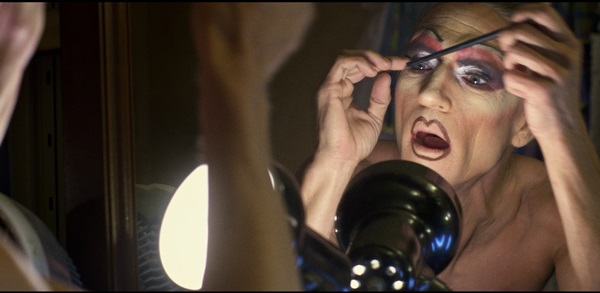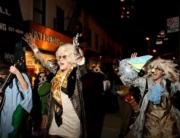Home to a population of just over 2,000, the sleepy and picaresque Eureka Springs, Arkansas, resembles at first glance any other small town in America. But then Michael Palmieri and Donal Mosher, the directors of this observant documentary, cut to a banner advertising a gay pride parade, which will be occurring in the shadow of an enormous statue of Jesus Christ looming in the distance. Things are going to get interesting, we assume.
Ultimately, The Gospel of Eureka turns out to be a relatively sedate slice of life and portrait from the evolving South, rather than anything more incendiary. Told in vérité style, the camera observes life unfolding at its own pace as the film examines how the local Christian and LGBTQ communities manage to co-exist together. More specifically, the narrative revolves around two major local events happening at more or less the same time: The Great Passion Play, an elaborate stage show established a half century ago, which retells the last two weeks of Christ’s life, and a series of drag shows at a local bar called Eureka Live Underground. One of its owners compares it to “a hillbilly Studio 54.”
Palmieri and Mosher give equal time to both scenes, and along the way we discover a few individuals who resist easy definitions as either LGBTQ or Christian. For example, one of the attendees of the religious-themed show is a transgender woman who self-identifies as devout. Meanwhile, no shortage of Christians, including a minister, speak out against using their faith as an excuse to condemn homosexuals.
Along with jumping back-and forth between the enormous, 4,000-seat amphitheater housing The Great Passion Play and the smaller, more intimate bar where the drag show takes place, the film checks in regularly on a vote on an ordinance banning any form of discrimination. Plenty of folks take their support or opposition to the streets, and yet civility rules. To their credit, the filmmakers make an effort not to portray those who are against the ordinance as uniformly homophobic or ignorant extremists. Although one interviewee offers the eye roll–worthy argument that society has become too permissive, another is more nuanced, claiming that the law undermines the church’s ability to regulate itself.
Throughout, a narrator (Mx Justin Vivian Bond) constantly reminds viewers about the town’s—and America’s—at times disgraceful history toward those who are different. However, by juxtaposing these two very different shows, the film highlights something universal: our capacity to feel passionate about the art we create. We observe the cast and crew of the religious play working furiously behind the scenes to hit their lighting cues and make costume changes on time, and close-ups reveal just how seriously they are taking this performance. Theirs is arguably more of a collaborate spectacle compared to their counterparts in drag, who mostly perform individually. However, in both cases, considerable effort is made.
Palmieri and Mosher refrain from delving much into their subjects’ offstage lives, resulting in a tone that feels respectful but rarely intimate. The moments that are exceptions involve two gay men, who are the founders of Eureka Live Underground as well as longtime domestic partners, one of whom has a serious illness. Hearing about their ordeal, it’s all the more apparent that attitudes toward the LGBTQ community are changing. This story line leads to one of the more genuinely poignant moments of the film—another resurrection of sorts.
For blue-state city-dwellers like myself, this film is downright revelatory. At a time when the country seems more divided than ever, The Gospel of Eureka offers inspiration and hope, not to mention it puts on an entertaining show or two.







Leave A Comment